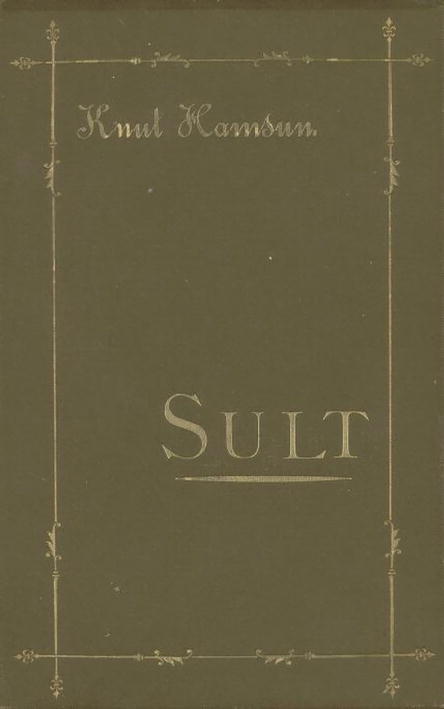Hunger (Hamsun novel)

First edition
|
|
| Author | Knut Hamsun |
|---|---|
| Original title | Sult |
| Translator |
George Egerton Robert Bly Sverre Lyngstad |
| Country | Norway |
| Language | Norwegian |
| Genre |
Psychological novel Philosophical novel |
|
Publication date
|
1890 |
| OCLC | 69732953 |
Hunger (Norwegian: Sult) is a novel by the Norwegian author Knut Hamsun published in 1890. Parts of it had been published anonymously in the Danish magazine Ny Jord in 1888. The novel has been hailed as the literary opening of the 20th century and an outstanding example of modern, psychology-driven literature.Hunger portrays the irrationality of the human mind in an intriguing and sometimes humorous manner.
Written after Hamsun's return from an ill-fated tour of America, Hunger is loosely based on the author's own impoverished life before his breakthrough in 1890. Set in late 19th-century Kristiania (Oslo), the novel recounts the adventures of a starving young man whose sense of reality is giving way to a delusionary existence on the darker side of a modern metropolis. While he vainly tries to maintain an outer shell of respectability, his mental and physical decay are recounted in detail. His ordeal, enhanced by his inability or unwillingness to pursue a professional career, which he deems unfit for someone of his abilities, is pictured in a series of encounters which Hamsun himself described as 'a series of analyses.'
In many ways, the protagonist of the novel displays traits reminiscent of Raskolnikov, whose creator, Fyodor Dostoevsky, was one of Hamsun's main influences. The influence of naturalist authors such as Émile Zola is apparent in the novel, as is his rejection of the realist tradition.
Hunger encompasses two of Hamsun's literary and ideological leitmotifs:
The novel's first-person protagonist, an unnamed vagrant with intellectual leanings, probably in his late twenties, wanders the streets of Norway's capital, Kristiania (Oslo), in pursuit of nourishment. Over four episodes he meets a number of more or less mysterious persons, the most notable being Ylajali, a young woman with whom he engages in a mild degree of physical intimacy.
He exhibits a self-created code of chivalry, giving money and clothes to needy children and vagrants, not eating food given to him, and turning himself in for stealing. Essentially self-destructive, he thus falls into traps of his own making, and with a lack of food, warmth and basic comfort, his body turns slowly to ruin. Overwhelmed by hunger, he scrounges for meals, at one point nearly eating his own (rather precious) pencil. His social, physical and mental states are in constant decline. However, he has no antagonistic feelings towards 'society' as such, rather he blames his fate on 'God' or a divine world order. He vows not to succumb to this order and remains 'a foreigner in life', haunted by 'nervousness, by irrational details'.
...
Wikipedia
